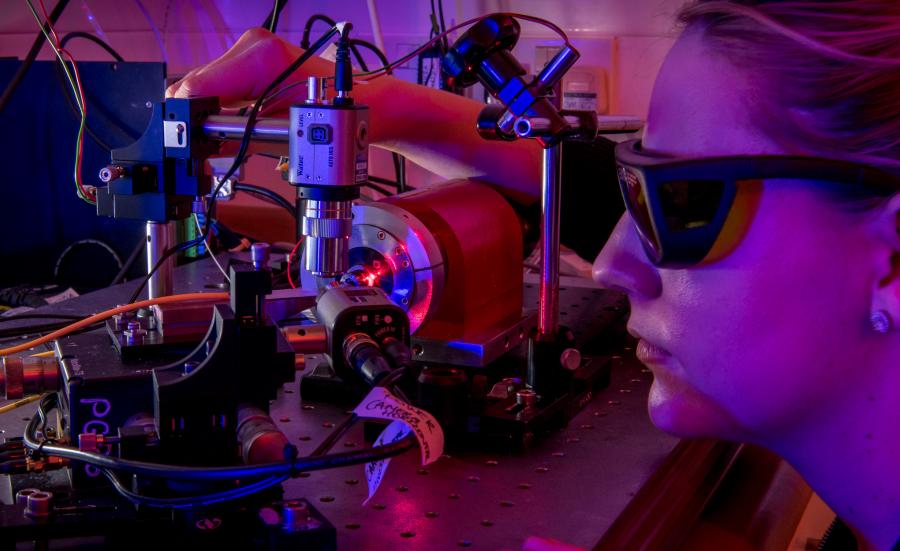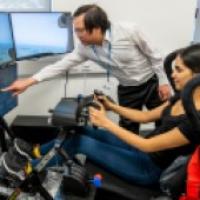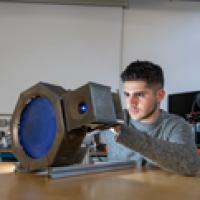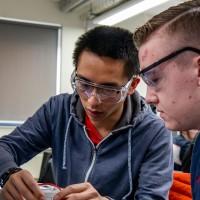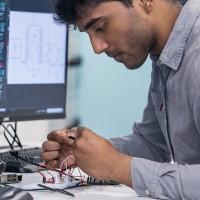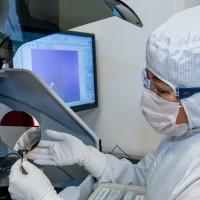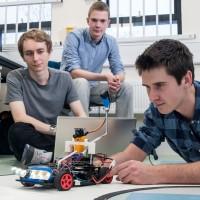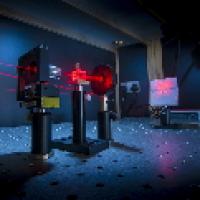About this course
We've changed some parts of this course for the 2020 to 2021 academic year due to coronavirus (COVID-19). These changes may affect how we'll teach you and which modules you'll take.
Infuse your Electronic Engineering studies with the science and technology of light. Photonics engineering has many applications, from broadband internet to precision medical and industrial tools. It’s also vital for new technologies such as quantum and photonic computing, which uses photons for ultra-fast, energy-efficient data processing. This accredited degree will give you access to professional registration as a Chartered Engineer.
On this 4-year, integrated master's, you'll train in the fundamentals of electronic engineering. This will provide a basis for your specialist photonics studies. You'll choose from a huge range of specialist modules, covering the latest advances in areas such as :
-
fabrication and microscopy
-
optical communications
-
nanoelectronic and quantum devices
-
metamaterials
-
digital coding and transmission
You’ll learn under academics from our prestigious Optoelectronics Research Centre (ORC). The ORC has an impressive record of discoveries - our researchers developed the optical components that power today’s internet.
As part of this course you can:
-
use our research facilities, including a high-voltage lab and our £110m clean rooms
-
develop your enterprise skills with help from our startup supporter, Future Worlds
-
build your own unique electronic systems
This MEng Electronic Engineering with Photonics degree is accredited by the Institution of Engineering and Technology on behalf of the Engineering Council for the purposes of fully meeting the academic requirement for registration as a Chartered Engineer.
We are also a member of the UK Electronics Skills Foundation.
Course location
This course is based at Highfield.
Awarding body
This qualification is awarded by the University of Southampton.
Download the Course Description Document
The Course Description Document details your course overview, your course structure and how your course is taught and assessed.
Changes due to COVID-19
Although the COVID-19 situation is improving, any future restrictions could mean we might have to change the way parts of our teaching and learning take place in 2021 to 2022. We're working hard to plan for a number of possible scenarios. This means that some of the information on this course page may be subject to change.
Find out more on our COVID advice page.
Entry requirements
For Academic year 202223
A-levels
A*AA including mathematics (minimum grade A) and an additional required subject (minimum grade A)
or
A*A*B including mathematics (minimum grade A*) and an additional required subject (minimum grade A*)
or
AAAA including mathematics and an additional required subject
A-levels additional information
Required A-level subjects include mathematics and either physics, further mathematics, electronics or computer science. Offers typically exclude General Studies and Critical Thinking. A pass in the science Practical is required where applicable.
A-levels with Extended Project Qualification
If you are taking an EPQ in addition to 3 A levels, you will receive the following offer in addition to the standard A level offer:
AAA including mathematics and an additional required subject, plus grade A in the EPQ
A-levels contextual offer
We are committed to ensuring that all applicants with the potential to succeed, regardless of their background, are encouraged to apply to study with us. The additional information gained through contextual data allows us to recognise an applicant's potential to succeed in the context of their background and experience.
Applicants who are highlighted in this way will be made an offer which is lower than the typical offer for that programme, as follows:
AAA including mathematics and an additional required subject
or
A*AB including grades A*A in mathematics and an additional required subject (in any order)
International Baccalaureate Diploma
Pass, with 38 points overall with 19 points required at Higher Level, including 6 at Higher Level in Mathematics (Analysis and Approaches) or 7 at Higher Level in Mathematics (Applications and Interpretation), and 6 at Higher Level in an additional required subject
International Baccalaureate Diploma additional information
Required Higher Level subjects include mathematics and either physics, further mathematics or computer science.
International Baccalaureate contextual offer
We are committed to ensuring that all learners with the potential to succeed, regardless of their background, are encouraged to apply to study with us. The additional information gained through contextual data allows us to recognise a learner’s potential to succeed in the context of their background and experience. Applicants who are highlighted in this way will be made an offer which is lower than the typical offer for that programme.
International Baccalaureate Career Programme (IBCP) statement
Offers will be made on the individual Diploma Course subject(s) and the career-related study qualification. The CP core will not form part of the offer. Where there is a subject pre-requisite(s), applicants will be required to study the subject(s) at Higher Level in the Diploma course subject and/or take a specified unit in the career-related study qualification. Applicants may also be asked to achieve a specific grade in those elements.
Please see the University of Southampton International Baccalaureate Career-Related Programme (IBCP) Statement for further information. Applicants are advised to contact their Faculty Admissions Office for more information.
BTEC
D in the BTEC National Extended Certificate plus grades A*A in A-level mathematics and an additional required A-level subject
or
D* in the BTEC National Extended Certificate plus grades AA in A-level mathematics and an additional required A-level subject.
We only accept the BTEC National Extended Diploma in acceptable subjects, when studied alongside A-level mathematics. We do not accept the BTEC National Diploma without A-level mathematics and an additional required A-level subject.
Applicants with a BTEC National Extended Diploma or a BTEC National Diploma can apply for the Engineering/Physics/Mathematics/Geophysics Foundation Year.
RQF BTEC
We are committed to ensuring that all learners with the potential to succeed, regardless of their background, are encouraged to apply to study with us. The additional information gained through contextual data allows us to recognise a learner’s potential to succeed in the context of their background and experience.
Applicants who are highlighted in this way will be made an offer which is lower than the typical offer for that programme.
Additional information
Required A-level subjects include mathematics and either physics, further mathematics, electronics or computer science. Offers typically exclude General Studies and Critical Thinking. A pass in the science Practical is required where applicable.
QCF BTEC
D in the BTEC Subsidiary Diploma plus grades A*A in A-level mathematics and an additional required A-level subject
or
D* in the BTEC Subsidiary Diploma plus grades AA in A-level mathematics and an additional required A-level subject.
We only accept the BTEC Extended Diploma in acceptable subjects, when studied alongside A-level mathematics. We do not accept the BTEC Diploma without A-level mathematics and an additional required A-level subject.
Applicants with a BTEC Extended Diploma or a BTEC Diploma can apply for the Engineering/Physics/Mathematics/Geophysics Foundation Year.
We are committed to ensuring that all learners with the potential to succeed, regardless of their background, are encouraged to apply to study with us. The additional information gained through contextual data allows us to recognise a learner’s potential to succeed in the context of their background and experience. Applicants who are highlighted in this way will be made an offer which is lower than the typical offer for that programme.
Access to HE Diploma
Applicants with an Access to HE Diploma should apply for the Engineering/Physics/Mathematics/Geophysics Foundation Year
Access to HE additional information
There are no additional requirements
Irish Leaving Certificate
Irish Leaving Certificate (first awarded 2017)
H1 H1 H1 H2 H2 H2 including mathematics at H1 and an additional required subject at H1
Irish Leaving Certificate (first awarded 2016)
A1 A1 A1 A2 A2 A2 including mathematics at A1 and physics at A1
Irish certificate additional information
Required subjects include mathematics and either applied mathematics, computer science or physics
Scottish Qualification
Offers will be based on exams being taken at the end of S6. Subjects taken and qualifications achieved in S5 will be reviewed. Careful consideration will be given to an individual’s academic achievement, taking in to account the context and circumstances of their pre-university education.
Please see the University of Southampton’s Curriculum for Excellence Scotland Statement (PDF) for further information. Applicants are advised to contact their Faculty Admissions Office for more information.
Cambridge Pre-U
D2, D3, D3 in three Principal subjects including mathematics and an additional required subject
Cambridge Pre-U additional information
Required Principal subjects include mathematics and either physics or further mathematics.
Welsh Baccalaureate
A*AA including mathematics (minimum grade A) and an additional required subject (minimum grade A)
or
A*A from two A-levels including mathematics and an additional required subject (in any order), and A from the Advanced Welsh Baccalaureate Skills Challenge Certificate
or
A*A*B including mathematics (minimum grade A*) and an additional required subject (minimum grade A*)
or
A*A* from two A-levels including mathematics and an additional required subject, and B from the Advanced Welsh Baccalaureate Skills Challenge Certificate
Welsh Baccalaureate additional information
Required A-level subjects include mathematics and either physics, further mathematics, electronics or computer science. Offers typically exclude General Studies and Critical Thinking. A pass in the science Practical is required where applicable.
Welsh Baccalaureate contextual offer
We are committed to ensuring that all learners with the potential to succeed, regardless of their background, are encouraged to apply to study with us. The additional information gained through contextual data allows us to recognise a learner’s potential to succeed in the context of their background and experience. Applicants who are highlighted in this way will be made an offer which is lower than the typical offer for that programme.
European Baccalaureate
85% overall including grade 9/10 in mathematics and grade 9/10 in physics
Other requirements
GCSE requirements
Applicants must hold GCSE English language (or GCSE English) (minimum grade 4/C) and mathematics (minimum grade 4/C)
Find the equivalent international qualifications for our entry requirements.
English language requirements
If English isn't your first language, you'll need to complete an International English Language Testing System (IELTS) to demonstrate your competence in English. You'll need all of the following scores as a minimum:
IELTS score requirements
- overall score
- 6.5
- reading
- 5.5
- writing
- 5.5
- speaking
- 5.5
- listening
- 5.5
We accept other English language tests. Find out which English language tests we accept.
You might meet our criteria in other ways if you do not have the qualifications we need. Find out more about:
-
our Access to Southampton scheme for students living permanently in the UK (including residential summer school, application support and scholarship)
-
skills you might have gained through work or other life experiences (otherwise known as recognition of prior learning)
Find out more about our Admissions Policy.
For Academic year 202324
A-levels
A*AA or AAAA including mathematics (minimum grade A) and either physics, further mathematics, electronics or computer science (minimum grade A) or A*A*B including mathematics (minimum grade A*) and either physics, further mathematics, electronics or computer science (minimum grade A*)
A-levels additional information
A pass in the science Practical is required where it is separately endorsed. Offers typically exclude General Studies and Critical Thinking. Applicants who have not studied the required subjects at A-level can apply for the Engineering/Physics/Mathematics Foundation Year. Please visit theFoundation Year page for more information.
A-levels with Extended Project Qualification
If you are taking an EPQ in addition to 3 A levels, you will receive the following offer in addition to the standard A level offer: AAA including mathematics and either physics, further mathematics, electronics or computer science, plus grade A in the EPQ
A-levels contextual offer
We are committed to ensuring that all applicants with the potential to succeed, regardless of their background, are encouraged to apply to study with us. The additional information gained through contextual data allows us to recognise an applicant's potential to succeed in the context of their background and experience. Applicants who are highlighted in this way will be made an offer which is lower than the typical offer for that programme, as follows: AAA including mathematics and either physics, further mathematics, electronics or computer science. Alternatively, A*AB including grades A*A in mathematics and either physics, further mathematics, electronics or computer science.
International Baccalaureate Diploma
Pass, with 38 points overall with 19 points required at Higher Level, including 6 at Higher Level in Mathematics (Analysis and Approaches) or 7 at Higher Level in Mathematics (Applications and Interpretation), and 6 at Higher Level in Physics or Computer Science
International Baccalaureate Diploma additional information
Applicants who have not studied the required subjects at Higher Level can apply for the Engineering/Physics/Mathematics Foundation Year. Please visit theFoundation Year page for more information.
International Baccalaureate contextual offer
We are committed to ensuring that all learners with the potential to succeed, regardless of their background, are encouraged to apply to study with us. The additional information gained through contextual data allows us to recognise a learner’s potential to succeed in the context of their background and experience. Applicants who are highlighted in this way will be made an offer which is lower than the typical offer for that programme.
International Baccalaureate Career Programme (IBCP) statement
Offers will be made on the individual Diploma Course subject(s) and the career-related study qualification. The CP core will not form part of the offer. Where there is a subject pre-requisite(s), applicants will be required to study the subject(s) at Higher Level in the Diploma course subject and/or take a specified unit in the career-related study qualification. Applicants may also be asked to achieve a specific grade in those elements. Please see the University of Southampton International Baccalaureate Career-Related Programme (IBCP) Statement for further information. Applicants are advised to contact their Faculty Admissions Office for more information.
BTEC
D in the BTEC National Extended Certificate plus grades A*A in A-level mathematics and an additional required A-level subject or D* in the BTEC National Extended Certificate plus grades AA in A-level mathematics and an additional required A-level subject. We will consider the BTEC National Extended Diploma in Engineering if studied alongside A-level mathematics. We will consider the BTEC National Diploma if studied alongside A-levels in mathematics and an additional required subject
RQF BTEC
We are committed to ensuring that all learners with the potential to succeed, regardless of their background, are encouraged to apply to study with us. The additional information gained through contextual data allows us to recognise a learner’s potential to succeed in the context of their background and experience. Applicants who are highlighted in this way will be made an offer which is lower than the typical offer for that programme.
Additional information
Required A-level subjects include mathematics and either physics, further mathematics, electronics or computer science. Offers typically exclude General Studies and Critical Thinking. A pass in the science Practical is required where it is separately endorsed. Applicants who have not studied mathematics and/or a second required subject at A-level can apply for the Engineering/Physics/Mathematics Foundation Year. Please visit the Foundation Year page for more information.
QCF BTEC
D in the BTEC Subsidiary Diploma plus grades A*A in A-level mathematics and an additional required A-level subject or D* in the BTEC Subsidiary Diploma plus grades AA in A-level mathematics and an additional required A-level subject. We will consider the BTEC Extended Diploma in Engineering if studied alongside A-level mathematics. We will consider the BTEC Diploma if studied alongside A-levels in mathematics and an additional required subject
We are committed to ensuring that all learners with the potential to succeed, regardless of their background, are encouraged to apply to study with us. The additional information gained through contextual data allows us to recognise a learner’s potential to succeed in the context of their background and experience. Applicants who are highlighted in this way will be made an offer which is lower than the typical offer for that programme.
Access to HE Diploma
Not accepted for this course. Applicants with an Access to HE Diploma in a relevant subject should apply for the Engineering/Physics/Mathematics Foundation Year. Please visit theFoundation Year page for more information.
Access to HE additional information
Irish Leaving Certificate
Irish Leaving Certificate (first awarded 2017)
H1 H1 H1 H2 H2 H2 including mathematics at H1 and an additional required subject at H1
Irish Leaving Certificate (first awarded 2016)
A1 A1 A1 A2 A2 A2 including mathematics at A1 and physics at A1
Irish certificate additional information
Required subjects include mathematics and either applied mathematics, computer science or physics. Applicants who have not studied the required subjects can apply for the Engineering/Physics/Mathematics Foundation Year. Please visit theFoundation Year page for more information.
Scottish Qualification
Offers will be based on exams being taken at the end of S6. Subjects taken and qualifications achieved in S5 will be reviewed. Careful consideration will be given to an individual’s academic achievement, taking in to account the context and circumstances of their pre-university education.
Please see the University of Southampton’s Curriculum for Excellence Scotland Statement (PDF) for further information. Applicants are advised to contact their Faculty Admissions Office for more information.
Cambridge Pre-U
D2, D3, D3 in three Principal subjects including mathematics and either physics or further mathematics.
Cambridge Pre-U additional information
Cambridge Pre-U's can be used in combination with other qualifications such as A levels to achieve the equivalent of the typical offer, where D2 can be used in lieu of A-level grade A* or grade D3 can be used in lieu of A-level grade A. Applicants who have not studied the required Principal subjects can apply for the Engineering/Physics/Mathematics Foundation Year. Please visit theFoundation Year page for more information.
Welsh Baccalaureate
A*AA including mathematics (minimum grade A) and either physics, further mathematics, electronics or computer science (minimum grade A) or A*A from two A-levels including mathematics and either physics, further mathematics, electronics or computer science, and A from the Advanced Welsh Baccalaureate Skills Challenge Certificate.
Welsh Baccalaureate additional information
A pass in the science Practical is required where it is separately endorsed. Offers typically exclude General Studies and Critical Thinking. Applicants who have not studied the required subjects at A-level can apply for the Engineering/Physics/Mathematics Foundation Year. Please visit theFoundation Year page for more information.
Welsh Baccalaureate contextual offer
We are committed to ensuring that all learners with the potential to succeed, regardless of their background, are encouraged to apply to study with us. The additional information gained through contextual data allows us to recognise a learner’s potential to succeed in the context of their background and experience. Applicants who are highlighted in this way will be made an offer which is lower than the typical offer for that programme.
European Baccalaureate
85% overall including grade 9/10 in mathematics (standard 5-period or advanced mathematics) and grade 9/10 in physics or advanced mathematics
Other requirements
GCSE requirements
Applicants must hold GCSE English language (or GCSE English) (minimum grade 4/C) and mathematics (minimum grade 4/C)
You might meet our criteria in other ways if you do not have the qualifications we need. Find out more about:
-
our Access to Southampton scheme for students living permanently in the UK (including residential summer school, application support and scholarship)
-
skills you might have gained through work or other life experiences (otherwise known as recognition of prior learning)
Find out more about our Admissions Policy.
Got a question?
Please contact our enquiries team if you're not sure that you have the right experience or qualifications to get onto this course.
Email: enquiries@southampton.ac.uk
Tel: +44(0)23 8059 5000
Course structure
The year 1 and 2 modules are similar across all our Electronic Engineering courses and provide a grounding in essential engineering topics.
In years 2, 3 and 4 you’ll specialise in photonics, and can follow your interests by choosing modules from a wide range of options. You can also take modules from other subject areas.
You’ll work in high-spec electronics and computer labs, equipped with the latest technology, hardware and software.
Year 1 overview
In the first year, you’ll study digital systems, and electrical materials and fields. There are core modules in:
-
mathematics
-
physics
-
electronics
-
programming
We'll develop your practical skills with extensive laboratory classes. In your first semester you’ll get to build processing boards.
Year 2 overview
Compulsory modules will explore:
-
signal processing
-
control and communication
-
electromagnetism
You'll also start to build your knowledge in key areas of Photonics. This includes looking at optical waveguides and photodetectors.
At the end of the year, you'll complete a 3-week team challenge, judged by an industry panel. Previous projects include the development of a home AI system.
Year 3 overview
You’ll complete a unique piece of individual research in a photonics topic of your choice. You'll be supervised by one of our expert academics. For some students, this project can lead to the publication of their first scientific paper.
You’ll study specialist topics, such as:
-
signal and image processing
-
nanoelectronic devices
-
optical communications
You can select optional modules covering topics, such as cyber security or machine learning.
You can also choose to:
-
study a language
-
take modules from other disciplines such as psychology or anthropology
-
take a range of innovative interdisciplinary modules
Year 4 overview
The main group design project is a great opportunity to experience working for an industry or academic customer. It is the only compulsory element in year 4. A previous project designed quantum computing lenses for the Networked Quantum Information Technologies Hub.
For the remaining modules, you can explore more photonic topics or choose options from other areas of electronics and computer science, including:
-
advanced fibre telecommunications
-
silicon photonics
-
optical fibres
-
machine learning
You can also apply to spend the second semester studying abroad at a partner institution.
Want more detail? See all the modules in the course.
Modules
Changes due to COVID-19
Although the COVID-19 situation is improving, any future restrictions could mean we might have to change the way parts of our teaching and learning take place in 2021 to 2022. We're working hard to plan for a number of possible scenarios. This means that some of the information on this course page may be subject to change.
Find out more on our COVID advice page.
For entry in Academic Year 2022-23
Year 1 modules
You must study the following modules in year 1:
To embed an understanding of Object Oriented development and grow specific skills in using C++ in a variety of situations.
To introduce digital system design, the principles of programmable logic devices, the implementation of combinational and sequential circuits, and the principles of hardware design using SystemVerilog, a state-of-the-art hardware description language.
To explain the mathematical techniques needed to analyse linear and simple non-linear electrical and electronic circuits.
This course lays the mathematical foundation for all engineering degrees. Its structure allows students with different levels of previous knowledge to work at their own pace. One of the pre-requisites for MATH3081 and MATH3082
To introduce the student to the concepts of programming using the C programming language, with an emphasis on programming for embedded systems.
To introduce the electronic properties of semiconductors and semiconductor devices
Year 2 modules
You must study the following modules in year 2:
To develop knowledge of the analysis of linear continuous-time systems. To introduce the basic analysis and design tools for electronic system control and communications engineering. To provide a comprehensive foundation for Part III/IV signal processing,...
This module is taught by a combination of lectures, laboratory exercises and a design assignment. You will gain practical knowledge of digital system design and of digital signal processing in the context of modern systems. The design exercise is inten...
The course presents the principles and applications of electromagnetic theory with examples in high-speed electronics, communications and electromagnetic compatibility, and provides an introduction to photonic engineering. It covers the underlying math...
Conventional laboratory experiments are useful mainly to assist understanding or analysis: because they are of necessity stereotyped, they are of limited usefulness when a circuit or system must be designed to meet a given specification. The majority of e...
The aims of this module are to: - Give students a solid grounding in mathematical methods and ideas in areas relevant to applications in engineering: Fourier series, Fourier transforms, eigenvalues, eigenvectors and eigenfunctions, linear ordinary differ...
You must also choose from the following modules in year 2:
This module focuses on how to create real electronic systems. It covers 'building block' circuits using bipolar transistors and FETs, and looks at the use and operation of op-amps. It also covers how to deliver timing in circuits, interfacing in mixed-sig...
This module looks at the how computer systems are designed and constructed, focussing on microcontrollers but also looking at how they fit into the context of other types of computer (e.g. DSP and desktop processor). It considers how data is processed and...
Semiconductor device technology has evolved beyond computation applications and is now increasingly being used in quantum electronics, lighting, lasers, high speed communications, photovoltaic energy harvesters, smart electronics for the Internet of Thing...
Year 3 modules
You must study the following modules in year 3:
This module will provide students with an introduction to management and law – knowledge and skills which can be applied to the operations of an engineering-based organisation. The learning outcomes address: managerial decisions, commercial aspects of eng...
The individual project gives students the opportunity to gain both detailed knowledge and practical experience in a more focussed area than generally possible elsewhere in their degree programme. Most projects are in the nature of a challenging enginee...
You must also choose from the following modules in year 3:
This module covers the development of modern computer architectures for servers, workstations, hand-held devices, signal processing and embedded systems from the introduction of the four-stage RISC pipeline to the present day.
Partial Differential Equations (PDEs) occur frequently in many areas of mathematics. This module extends earlier work on PDEs by presenting a variety of more advanced solution techniques together with some of the underlying theory.
To cover in some depth those areas of circuitry likely to be used between an analogue signal source and a digital signal processing system, making maximum use of available integrated circuits. This fits in with our overall programme of providing a broa...
Modern biology poses many challenging problems for the computer scientists. Rapid growth in instrumentation, and our ability to archive and distribute vast amounts of data, has significantly changed the way we attempt to understand cellular function, and ...
- To expand knowledge of techniques for information transmission via discrete (digital) channels, which have a wide area of applications, i.e. distributed computer systems, instrumentation and control systems, as well as communication systems of all types...
The topics considered are: z transforms, sampling and reconstruction, discretisation, elements of realisation theory, controller design via pole placement, observers, optimal control design.
With rapid popularity and advancements in technologies like the internet-of-things (IoT) and network-on-chip (NoC), the ability to connect and network embedded devices is becoming ever more commonplace, and a feature of most electronic devices. This modul...
Machine Learning is about extracting useful information from large and complex datasets. The subject is a rich mixture of concepts from function analysis, statistical modelling and computational techniques. The module will cover the fundamental principles...
This module describes in detail recent development in electronic devices that reduce energy consumption, generate power, or advance the distribution of power. Together these set of devices will play an essential role in the reduced dependence on fossil fu...
This module will be first offered in the 2019/20 academic year. This module will provide a basic grounding in navigation guidance and control with particular aspects on the processing of the signals involved and overall system integration.
Many classes of problems are difficult to solve in their original domain. An integral transform maps the problem from its original domain into a new domain in which solution is easier. The solution is then mapped back to the original domain with the inver...
The module will discuss all important issues related to scaling down the transistor size into the nanometer regime, such as high-k dielectrics and FINFETs. The teaching will be complemented with a finite element simulation of the MOS scaling which will br...
The module introduces the operational research approach for modelling and solving engineering and management problems.
The module provides an introduction to the theory and practice of optimization techniques. It covers linear programming as well as nonlinear programming. This module is suitable to those who want to apply computational optimization methods to their proble...
This module gives a broad introduction to development of real-time and embedded systems
Robots are becoming more widely used in society, with applications ranging from agriculture through to manufacturing, with increasing interest in autonomous systems. This module will introduce students to the fundamentals of robotic systems including k...
The course requires to understand C code, assembly language, x86 architectures and memory allocation (a refresher will be provided).
Signal processing is an essential part of human life and of modern industrial systems. As humans we see and hear and process signals. This is the same in electronic systems: we sense and then process signals. We need to be able to understand these signals...
This module introduces both the wireless and optical propagation environments, the modelling of the corresponding channels as well as their implications on the design and architecture of wireless and optical communications systems. The basic principles of...
Year 4 modules
You must study the following module in year 4:
This module provides an introduction to intensive group project work in collaboration with an industrial or academic customer. Students work in groups of at least four people on a project typically based on an idea from an industrial partner, or from an a...
You must also choose from the following modules in year 4:
Communications is arguably the most widespread application of fibre optics, and naturally forms an essential part of an MSc Programme specialising on fibre technologies. This module will cover topics ranging from the more general (aimed at students with a...
This module is taught in Semester 2. It is particularly aimed at equipping our MSc Mobile Communications and Smart Networking, and MEng Electronic Engineering with Wireless Communication students with advanced communication theory and technologies, vital ...
The key aim of this module is to provide the background and the methods for the understanding of the operation of basic analogue CMOS cells, and how to design common functions. The emphasis is placed on design of analogue functions specifically as part of...
This module will introduce the student to key topics within control and signal processing, developing understanding through a combination of theoretical content and practical application. The theoretical content is focussed in a number of key themes wi...
The aim of this module is to provide an overview of a range of biomolecular, microscale and nanoscale systems and devices, including sensors. The module consists of practical work on three different systems, involving construction and characterisation wit...
This module lies at the intersection of robotics and biology. Through the abstraction of design principles from biological systems, it is possible to develop a range of core competences, including mechatronic systems, sensor and actuator technologies. By ...
The challenge of computer vision is to develop a computer based system with the capabilities of the human eye-brain system. It is therefore primarily concerned with the problem of capturing and making sense of digital images. The field draws heavily on ma...
This module covers the mathematics, techniques, and applications of modern cryptography. We will look at the history of code making and code breaking, and draw lessons for the future from the mistakes and successes of the past. We will also give a gentle ...
Describe the design of complex digital systems using a (SystemVerilog and SystemC based) behavioural synthesis approach. Provide understanding of the algorithms which underpin behavioural synthesis including scheduling, allocation and binding. Gain ...
This module gives a broad introduction to application-specific processor system design and illustrates the use of such processors in the broader context of complex digital systems. A significant portion of the module assessment is coursework where stud...
Evolution by natural selection has created amazingly complex and sophisticated solutions to some very difficult problems - how exactly does it achieve this, and how can we harness this capability for engineering artificial systems and computational proble...
This course covers some advanced techniques that have the potential for application in the future generations of wireless communications systems. Recently, the research and development in wireless communications have been focused on the techniques for the...
This module is useful to introduce: - Image processing and its relation to signal processing. - Image transformations for filtering, coding and etc. - Histogram processing algorithms to enhance image qualities and visibility. - Theories analysing and ...
The Individual Research Project is a 7.5 ECTS credit masters level module undertaken by independent study that allows students to demonstrate mastery of an advanced aspect of their discipline, including critical evaluation of current research and research...
The aim of the module is to introduce students to the fundamentals of machine learning and then to apply the advanced machine learning principles for the design and optimisation of wireless communications systems and mobile networks. Recently, the rese...
This module provides an overview of modern microfabrication technologies for the making of micro structures applicable to device engineering. The various fabrication techniques that are relevant for microdevices in the field of electronics, optoelectroni...
This module teaches the basics of the behaviour of fluids in microsystems, specifically focussing on the interaction of fundamental physical mechanisms and the design of microfluidic devices. It also reviews and analyses the state of the art in applied mi...
This module presents a broad overview of microsensor technologies, including the basic principles of measurement systems and the scaling effects arising from system miniaturisation. The practical component, assessed by a Lab Report, involves the design an...
The emphasis of this module is on the methods required to develop mathematical models using differential equations to understand physical problems. The module involves both conventional lectures as well as discussion lectures. The discussion lectures comp...
This course consists of two parts: 'Nanofabrication' deals with the fabrication of structures that are smaller than 100 nm, while 'Microscopy' concerns the visualisation of such small features. Advanced optical lithography concepts are illustrated by a co...
Modern (and future) aircraft employ a variety of nonlinear techniques to both design control systems and perform analysis of the arising closed-loop. This is due to the fact that aircraft dynamics are fundamentally nonlinear and also, with the widespread ...
Often in mathematics, it is possible to prove the existence of a solution to a given problem, but it is not possible to "find it". For example, there are general theorems to prove the existence and uniqueness of an initial value problem for an ordinary di...
Optical fibre sensor technology is playing an increasing role in modern-day life with a range of applications emerging in areas spanning civil engineering, defence and the life sciences. This module focuses on a key area of ORC expertise that has develope...
In-depth knowledge of optical fibres as a light guiding medium is vital for understanding most other areas of optical fibre technology (telecommunications, sensors), and as support for practical work in this field. This module will describe the core areas...
The aim of this module is to provide an overview of advancement of quantum devices and technology in line with the development of nanoelectronics and nanotechnology. Students will gain knowledge of basic quantum mechanics and how the quantum mechanics are...
This course covers security and trust of hardware and embedded devices, with a particular focus on the emerging security challenges facing the internet of things technology. It includes the following topics: vulnerabilities in current digital system desig...
The course will present an introduction to guided waves, optical modes, and propagation characteristics of photonic circuits, using Silicon Technology by way of example.
This module prepares students to develop an understanding of the critical issues and application of software project management. It introduces the students to the tools, techniques and body of knowledge involved in each stage of the project management lif...
Design hierarchical modules using a layout editor. Demonstrate project management and time management skills including working to deadlines and planning your work beyond the next deadline. Communicate your work accurately and concisely through writt...
This modules provides an understanding of the design and layout of digital VLSI circuits and systems through laboratories and design exercises making use of appropriate CAD tools.
This course is intended to give students an outline of how wireless communication and computer networks work "above the physical layer". This includes the interoperability of wireless networks such as WiMax/GPRS and WiFi to provide WiFi on trains etc. How...
This course introduces the principles and techniques needed to design a wireless transceiver. We will cover the process needed to take the main principles of digital communications such as digital modulation and detection. Through lectures and coursework,...
Learning and assessment
The learning activities for this course include the following:
- lectures
- classes and tutorials
- coursework
- individual and group projects
- independent learning (studying on your own)
Course time
How you'll spend your course time:
Year 1
Study time
Your scheduled learning, teaching and independent study for year 1:
How we'll assess you
- coursework, laboratory reports and essays
- design and problem-solving exercises
- individual and group projects
- oral presentations
- written exams
Your assessment breakdown
Year 1:
Year 2
Study time
Your scheduled learning, teaching and independent study for year 2:
How we'll assess you
- coursework, laboratory reports and essays
- design and problem-solving exercises
- individual and group projects
- oral presentations
- written exams
Your assessment breakdown
Year 2:
Year 3
Study time
Your scheduled learning, teaching and independent study for year 3:
How we'll assess you
- coursework, laboratory reports and essays
- design and problem-solving exercises
- individual and group projects
- oral presentations
- written exams
Your assessment breakdown
Year 3:
Year 4
Study time
Your scheduled learning, teaching and independent study for year 4:
How we'll assess you
- coursework, laboratory reports and essays
- design and problem-solving exercises
- individual and group projects
- oral presentations
- written exams
Your assessment breakdown
Year 4:
Academic support
You’ll be supported by a personal academic tutor and have access to a senior tutor.
Course leader
Stuart Boden is the course leader.
Careers
This course is accredited as meeting the full academic requirement for registration as a chartered engineer.
With a highly respected electronic engineering degree and specialist expertise, you’ll have excellent career prospects in many areas of the electronics sector, particularly optoelectronics and telecoms companies.
Most of our students go straight into electronic engineering jobs in high-tech companies. You'll develop transferable skills to suit a wide range of other sectors. Skills include:
-
intellectual and problem-solving
-
team-work
-
project management
-
communication
Our graduates have succeeded in sectors such as finance and law.
This photonics engineering degree is also a great foundation for further study at PhD level.
Electronics and Computer Science graduates have secured roles at organisations including:
-
Apple
-
McLaren
-
Microsoft
-
Samsung
-
Sony
Our faculty's Careers Hub provides specialist career support and lets you connect with employers. It includes:
-
an Electronics and Computer Science careers fair, attended by major electronics companies
-
an online jobs and placements portal
-
paid summer internships
Our support for innovation and enterprise means we have a track record of success. For example, programme leader and wireless communications specialist Professor Rob Maunder founded AccelerComm Ltd to bring his 5G-ready processor to market.
Careers services at Southampton
We are a top 20 UK university for employability (QS Graduate Employability Rankings 2019). Our Careers and Employability Service will support you throughout your time as a student and for up to 5 years after graduation. This support includes:
work experience schemes
CV and interview skills and workshops
networking events
careers fairs attended by top employers
a wealth of volunteering opportunities
study abroad and summer school opportunities
We have a vibrant entrepreneurship culture and our dedicated start-up supporter, Futureworlds, is open to every student.
Fees, costs and funding
Tuition fees
Fees for a year's study:
- UK students pay £9,250.
- EU and international students pay £23,720.
What your fees pay for
Your tuition fees pay for the full cost of tuition and all examinations.
Find out how to:
Accommodation and living costs, such as travel and food, are not included in your tuition fees. Explore:
Bursaries, scholarships and other funding
If you're a UK or EU student and your household income is under £25,000 a year, you may be able to get a University of Southampton bursary to help with your living costs. Find out about bursaries and other funding we offer at Southampton.
If you're a care leaver or estranged from your parents, you may be able to get a specific bursary.
Get in touch for advice about student money matters.
Scholarships and grants
You may be able to get a scholarship or grant that's linked to your chosen subject area.
We award scholarships and grants for travel, academic excellence, or to students from underrepresented backgrounds.
Support during your course
The Student Services Centre offers support and advice on money to students. You may be able to access our Student Support fund and other sources of financial support during your course.
Funding for EU and international students
Find out about funding you could get as an international student.
How to apply
When you apply use:
- UCAS course code: H680
- UCAS institution code: S27
What happens after you apply?
We will assess your application on the strength of your:
- predicted grades
- academic achievements
- personal statement
- academic reference
We'll aim to process your application within two to six weeks, but this will depend on when it is submitted. Applications submitted in January, particularly near to the UCAS equal consideration deadline, might take substantially longer to be processed due to the high volume received at that time.
Equality and diversity
We treat and select everyone in line with our Equality and Diversity Statement.
Got a question?
Please contact our enquiries team if you're not sure that you have the right experience or qualifications to get onto this course.
Email: enquiries@southampton.ac.uk
Tel: +44(0)23 8059 5000
Related courses
- Courses
-
Student life
- Accommodation
- Our campuses
- Our cities
- Student community
- Sports and gyms
- Support and money
- Halls Filter
- Research
- Business
- Global
- Open days and visits
- Clearing
- Schools and colleges
- About
- Visit
- Alumni
- Departments
- News
- Events
- Contact
